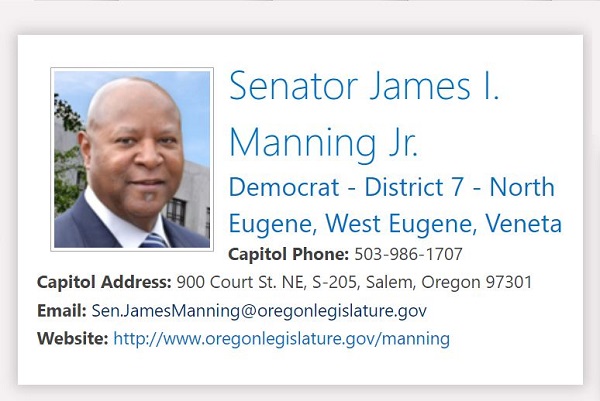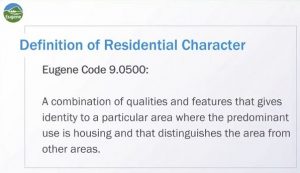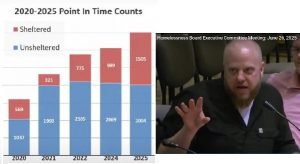Sen. Manning: ‘I have unfinished work here in Oregon’
6 min read
State Senator James Manning said he is not running for the United States Congress. He said he has unfinished work right here in Oregon.
[00:00:07] Sen. James Manning: As you know, I am the current Senate President Pro Tem. Senate President Peter Courtney announced that he is not running again. I’ve made it known to him and a number of my colleagues that I plan to run for Senate President in 2023. So you know, I’m hearing all kinds of different rumors. I am not running for CD4. I’ll leave it up to others. I have unfinished work here in Oregon.
[00:00:34] For example, I had the Senate Bill 770, which is the Universal Health Care Task Force that I’m very committed to. Over the years I’ve spoken with legislators in Washington state, California, and Hawaii that share a vision of mine, of a universal healthcare system. We have put together under Senate Bill 770 a task force. The task force is doing a marvelous job and they will bring a report back to the legislature in September.
[00:01:11] The intent of this would be that it will go to the people, to vote, to determine whether or not you would like to have a universal healthcare system. It will expand the ACA (Affordable Care Act) and you’re looking at all those other government programs, Medicare, Medicaid, inclusive of those and programs that we have statewide.
[00:01:31] A few years ago, we provided healthcare for 450,000 Oregonians without healthcare. And the reason why I’m so passionate about the universal health care system, as you know, currently we have a large number of Oregonians that wait until the very last minute before they seek any kind of medical care. And then they wind up going to our emergency rooms. And those costs are not just absorbed by the hospital, but we, you have insurance, you will absorb some of those costs as well.
[00:02:09] Why not get to a place where everybody has a little bit of something? Not to mention the fact is that healthcare for most businesses is quite expensive. If you had a workforce that already had health care, to me that would attract a lot of businesses to come in.
[00:02:27] We’re trying to increase the wages, reduce the homeless population, and to provide more quality education for our students.
[00:02:36] I was a huge supporter of the Student Success Act. That bill resulted in pre-K or early learning programs and K through 12, that will receive an additional— outside of their own budget— an additional billion dollars a year. That will fund these CTE programs that we’re talking about. That will also help us when we’re talking about community colleges. That’s where a lot of the apprenticeship programs are going to come out of. So funding those programs are huge, from early learning to K-12.
[00:03:11] …We do need some tests in order to measure students’ effectiveness where students are, whether or not students require an additional level of support or tutoring. That is acceptable. But when I talk to a first grade teacher and she tells me that he has given her first grade class over 100 tests, that’s too much. That is counterproductive to where we want when we’re talking about learning.
[00:03:41] Kids in first grade, second grade need to start understanding citizenship. They understand how to get along with each other and start enjoying each other, all of those things that our kids actually need in order to develop and be ready to move on to the next grade level.
[00:03:58] We have been struggling with that homelessness issue. And one of the reasons that we struggle with that is because the population of unhoused continue to grow. We have people that fell on hard times due to no fault of their own. They got priced out. They can’t afford the rent. They can’t afford childcare. They can’t afford a lot of other things.
[00:04:20] So they’re living out of their cars. Their kids are going to school, living out of their cars, all of these things. And I am so embarrassed that we are even at a place where this is going on in our community. First thing I want to do is uplift those folks, get them, those families into housing, safe housing. And I don’t mean putting in shacks or Conestoga huts or anything like that, I mean apartments or homes, so that they can maintain dignity and respect. After all, we all deserve and require a level of dignity and respect as human beings.
[00:04:58] More importantly, we’re all Oregonians. We should all look out for each other as we do for our students and our children.
[00:05:06] When we start talking about the homelessness, we passed a bill that put in over $400 million investment into low-income housing, but I want to make sure that these housing are energy efficient and that they are in an area that is not put on the side, out in the boondocks of West Eugene, but also blend in with the community.
[00:05:32] When I lived in Australia, 2002 to 2005, there were a lot of neighborhoods that were very upscale. I went and I visited a million-dollar home, a mansion, and next to it was another one. But then between the two mansions, there was what they characterized as a flat, we call them apartments. It was beautiful. You never would have known the difference. And here’s the reason why. Australians have already figured it out. If you take care of everyone, everyone will rise together. We have a problem in our country because we are moving very rapidly to the Have, Have Some, and then Have None.
[00:06:13] So there are a lot of things that I can go on, but I see my good friend, Mike Clark has his hand up.
[00:06:21] Eugene City Councilor Mike Clark: Senator, thank you for being here. Thank you for representing us at the state. On the issue of homelessness that you mentioned, Ballot Measure 110 made misdemeanors out of many drug use and possession felonies. And I’m wondering as a part of that ballot measure was also an obligation on the state to get much more robust in provision of and funding for drug treatment. And I’m just wondering about some of the efforts at the state level to fulfill those requirements of Ballot Measure 110, if you have any knowledge about the conversations taking place.
[00:06:55] Sen. James Manning: Mike, thank you. And by the way, Ballot Measure 110 was voted on by the people of Oregon. The legislature did not do this. The people of Oregon, voters said they want this. Oregon voters have a huge heart. They want to help people. And the reason that they wanted to do this is, locking people up for addiction is not a way of curing the problem. It can prolong the problem and cause more harm.
[00:07:22] But funding the programs, it’s something that we have to do. When we get these ballot measures with no funding source attached, then the legislators, we have to try to figure out how to do this because the voters said that ‘This is what we want and now make it happen.’
[00:07:42] You know, I want to know who is leading this, OHA or who exactly from OHA is spinning off? And understanding it comes down to some nonprofits that deals with drug and alcohol addiction. Some programs are fairly new. The referrals for individuals that have substance abuse issues, the court has a piece in there as well. So this was a big thing that has a lot of moving parts.
[00:08:12] I’m looking at talking to our Chief Justice Martha Walters who is a good friend of mine. And we’re going to have a conversation and see when they’re going to come and give you that implementation.
[00:08:23] We got some work to do, but it’s going to take some time. It’s not going to happen overnight.
[00:08:29] John Q: Senator James Manning at the Northeast Neighbors meeting April 4.



